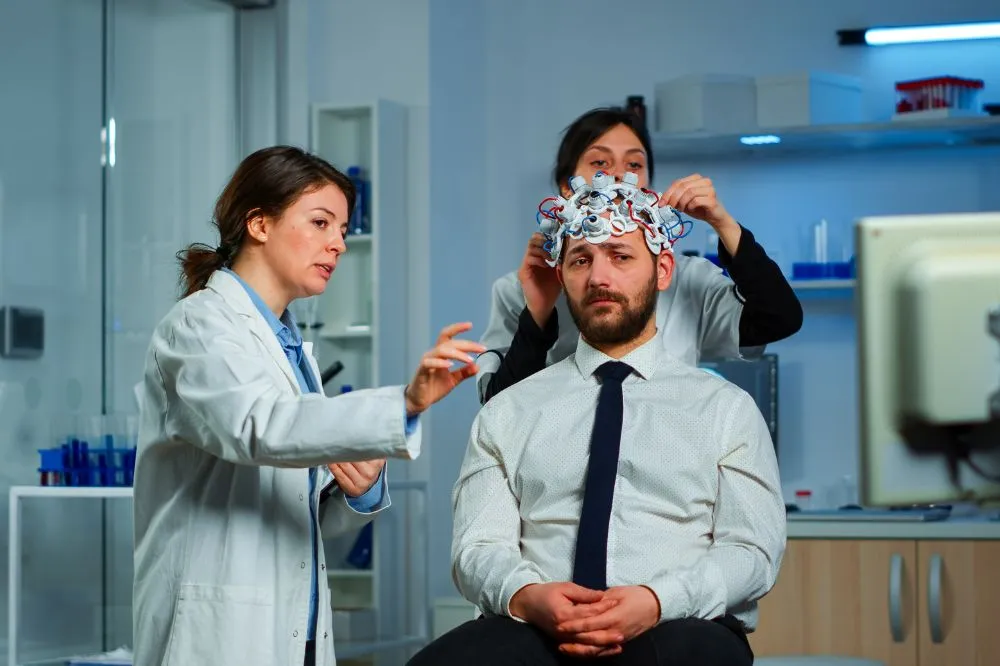Summary: People do not generally associate mental health disorders with infectious diseases. However, studies show that the brain regulates infection and inflammation in multiple ways, including neuroendocrine responses and even behavioral changes. Studies also show that severe conditions like sepsis are associated with a higher risk of anxiety, PTSD, and other mental health disorders. However, to date, researchers do not know the underlying mechanism. The new study suggests that activation of neural circuits like the bed nucleus of the stria terminalis and the central nucleus of the amygdala play an important role in post-infection anxiety and PTSD.
One does not usually associate infectious diseases with mental health disorders. However, as the new study shows, some severe infections may alter the working of specific brain centers leading to different mood disorders. It would be unwise to think that infections or inflammatory processes affecting various body parts cannot influence mental health. However, one must realize that the brain has a say in all body activities and regulates immune responses.
Sometimes, more severe infections may cause dysregulation of brain function in multiple ways. Science has just started to understand the way in which the brain regulates localized and systemic inflammation. There appear to be two ways the brain can detect and control inflammation. First is the humoral pathway. It means that some of the circulating inflammatory mediators can enter the brain. Thus, the brain can sense inflammation and its severity and initiate a response accordingly.
The second way is a neuronal pathway. Sensory afferent fibers send a signal to the brain, including information on local inflammatory conditions, and then the brain can regulate things. Just take an example of the Vagus nerve. It can detect even the minutest inflammation in the gut and lungs. Once the brain has received humoral and neural signals, it can initiate regulatory responses that involve neuroendocrine, neurovegetative, and behavioral responses. Among neural pathways, autonomic nervous and limbic systems play essential roles in these regulatory responses.
An example of neuroendocrinal response is the release of cortisol, which is a stress hormone. Cortisol is quite good at regulating inflammation. Similarly, behavioral changes also help regulate inflammation. Thus, changes in mood, appetite, and sleep all play an important role in inflammation regulation.
All the behavioral changes aim to regulate inflammation. However, sometimes, the body may fail to initiate optimal responses, which may cause mood dysregulation and increase the risk of psychological disorders. One of the conditions in which there is much risk of inadequate body responses is sepsis. It is a severe and disseminated infection. It causes severe immune response and inflammation. Sepsis is among the leading causes of mortality globally, as it is highly challenging to manage with antibiotics.
Since sepsis is a life-threatening condition, it means that the brain’s responses to the condition are also massive. However, now studies suggest that these responses may cause severe damage to mental health, leading to chronic anxiety, depression, and even other mental health issues. PTSD is another common result of a severe and prolonged infection like sepsis.
Although doctors know that sepsis increases the risk of anxiety, PTSD, depression, and other mental health issues, they do not know how to reduce this risk as little is known about the underlying mechanism.
In one of the first kinds of studies published in the journal Brain, researchers tried to understand how infection and inflammation might cause mental health issues. In the experimental study, they induced sepsis in mice. They found that after two weeks, these mice developed anxiety. They also found signs that resemble PTSD.
In the study, they could identify changes in specific neural circuits like the bed nucleus of the stria terminalis but, more importantly, in the central nucleus of the amygdala. This study is one of the first to identify changes in neural circuits related to anxiety and PTSD post sepsis. These findings can form the basis for further studies into the subject.
Understanding how sepsis or severe inflammation causes mental health & depressive mood disorders may help find effective preventive measures and telehealth treatment. These findings are especially important, as neuroinflammation and resulting psychiatric disorders are also found in those affected by Covid-19.






